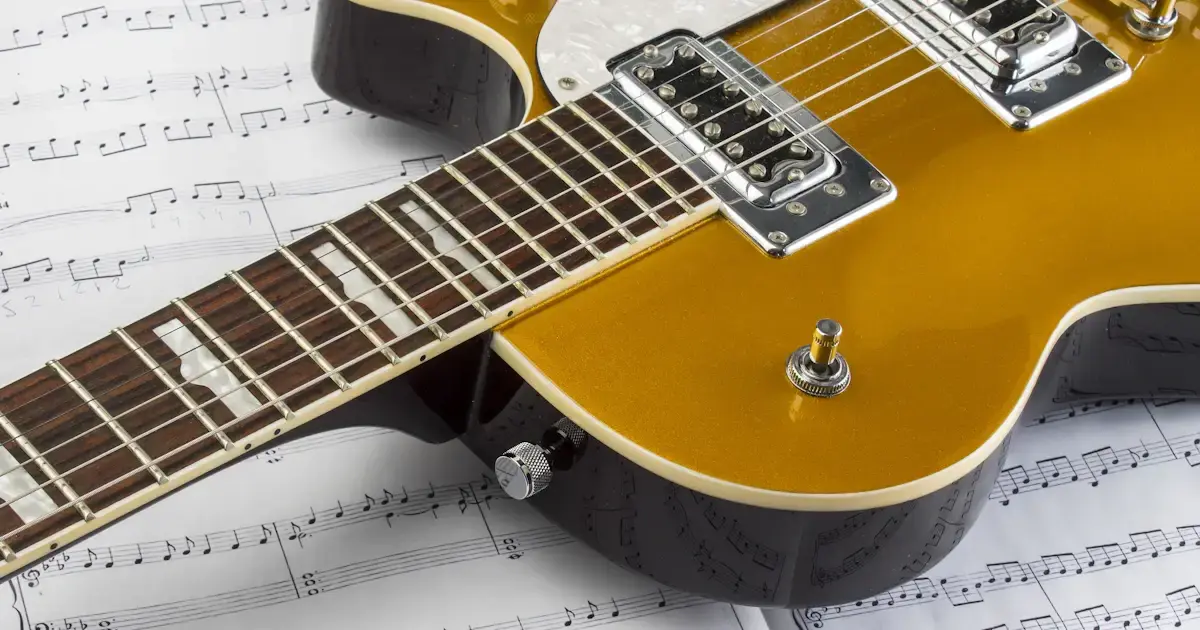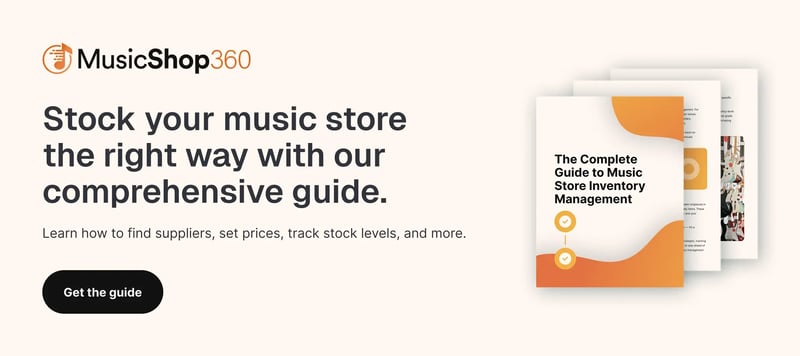
The best businesses run on data.
Luckily, modern technology has made it easier than ever for businesses of all sizes to track their most important metrics. In the music retail industry, some of these include sales, cost, profit, inventory counts, and inventory turnover. But there are many other retail metrics that shed light on how your business is doing.
Having accurate and complete data helps you make informed decisions about your music store, including which instruments to stock, how large your orders need to be, and what services to offer. Modern point of sale (POS) systems track retail metrics in customizable reports, so you have easy access to data that gives you these insights.
In this blog, we’ll discuss the eleven most important retail metrics you need to be tracking in reports at your music store — and how a solid POS system simplifies this process.
Sales and Financial Metrics
Your business ultimately exists to support you and your employees, so sales and other basic financial retail metrics are essential. By recording and analyzing these metrics, you not only determine whether your business is achieving its goals, but also make sure your finances are in order for tax purposes.
1. Gross Sales
Gross sales refers to revenue brought in by your music store before accounting for expenses. It’s important to know how much overall revenue you’re earning to plan your expenses. It’s equally important to know the gross sales total for one type of item compared to another. If guitars are bringing in most of your revenue but flutes are falling behind, these insights allow you to adjust your inventory and promotion strategies.
2. Net Sales
As the old saying goes, “you have to spend money to make money,” and this retail metric accounts for both what you spend and what you make. Net sales refers to your total revenue after expenses, which gives you a better understanding of your music store’s profitability.
3. Sales Tax Collected
Tax totals are important retail metrics to track to ensure you’re complying with the tax code and can successfully file your business returns each year. Retail businesses are required to collect sales tax, so track this metric to make sure you’re following the local and federal laws.
4. Retail Business Expenses
To maintain profitability, you need to understand your expenses. This includes the cost of inventory, rent, employees, and other costs associated with running your music business. Knowing your expenses helps you set the right sales goals and spot opportunities to cut costs where possible.
Customer Metrics
These metrics help you understand your customers’ behavior, so you can better serve them.
5. Customer Purchases
Modern POS systems are equipped with customer relationship management (CRM) tools. These features allow you to track information about your customers, such as how many purchases they make, what items they buy, and how much they spend. This allows you to send out personalized marketing and offer better recommendations to customers.
If a customer has been buying guitar accessories like picks and strings, for example, you can send them deals and discounts on guitars to encourage them to upgrade. Customers are more likely to make additional purchases when they get relevant recommendations.
Related Read: 9 Music Store Advertisement Ideas To Try Today
6. Customer Loyalty Points
Loyalty programs incentivize customers to choose your music store over a competitor by rewarding them for repeat visits.
Loyalty programs generally take one of these forms:
- Point-based
- Spend-based
- Tiered structure
Regardless of which structure you choose, loyalty programs typically work the same way. When customers earn a certain amount of loyalty credit, they can redeem it for a reward — like a discount on a violin, a free maintenance kit, or an exclusive store-branded carrying case.
For a loyalty program to be effective, you need to accurately track your customers’ points. CRM software included in POS systems can often perform this function. Make sure you have quick access to loyalty points, so you can create a faster checkout experience for your customers.
Related Read: Retail Customer Experience: 11 Best Practices for Music Stores
7. Open Rates and Click-Through Rates
Email and SMS communications are popular marketing tools for retail stores. With the help of CRM software, you can send personalized messages to customers. You can send a customer an email or text message after a purchase or on their birthday, for example.
These messages can include a discount on their next purchase or recommendations about similar products they might enjoy. If a customer recently purchased small instruments like bongos or a harmonica, you might suggest a ukulele next.
Open rates measure the number of customers who open your messages. Click-through rates tell you how many customers clicked the link in your message. These retail metrics help you understand how effective your email and SMS marketing is, so you can make adjustments to your strategy to gain more traction.
Inventory Management Metrics
Managing inventory is one of the most crucial tasks of a retail store owner, but to do this effectively, you need accurate numbers.
8. Inventory Levels
A cloud-based POS system gives you instant access to accurate inventory counts. It’s important to track this metric to avoid overstock and stockouts. By monitoring how many products you have on hand, you can reorder sold inventory, and offer discounts to move items that are sitting on the shelves.
Related Read: Where Do Music Stores Get Their Inventory? + 5 Tips for Managing Yours
9. Inventory Turnover
Different musical instruments and accessories have different rates of turnover. While stocking a variety of items at your music store helps you serve more customers, paying attention to inventory turnover rates helps you order the appropriate amounts of different products.
Some POS systems allow you to set an automatic reorder point, which is helpful for your most popular products. When the stock of a specific item goes below a certain threshold, the system automatically places an order to bring the total back up to the level you set. This ensures you never run out of your most wanted products.
Multilocation Metrics
If you manage multiple music store locations, there are additional retail metrics that are important to track.
10. Multilocation Sales
For a multilocation music store, you need to track both total sales for the entire business and totals for individual locations. This helps you find insights about your customers in certain areas and across the entire business. If one location is closer to a school, for example, you may see higher rentals rates around the fall season. Identifying these trends helps you create individual marketing and inventory plans for each location.
Related Read: 5 Music Retail Industry Trends To Look Out For
11. Stock Levels Across Stores
Sometimes, businesses with multiple locations strategically move their inventory from one location to another. If you’re running out of saxophones at one location and have plenty of them at another, it makes sense to transfer a few units to the location with the lower stock to turn over items faster. By having access to stock levels for various locations, you have the information you need to make these decisions.
Track Essential Retail Metrics With Music Shop 360
The more data you have access to as a business owner, the more informed decisions you can make. Paying attention to your music store’s key metrics helps you determine what instruments and accessories to stock and how to promote them to customers. Tracking customer information with CRM tools help you build customer loyalty, ensuring your business’ long-term success.
To track all of these metrics, you need a POS system. Music Shop 360 is a cloud-based POS solution designed specifically for the music retail industry. Our software includes features like payment processing, inventory management, e-commerce, and data analytics.
Music Shop 360 helps you track these metrics and allows you to create reports that summarize your business’ performance. The insights you gain from these reports help you make the best decisions for your business, comply with regulations, and increase sales. By tracking and monitoring these retail metrics and making adjustments accordingly, you can create a customized strategy that fits your music store.
To see what Music Shop 360 can do for your business, schedule a demo today!




 by
by 





![4 Music Store Inventory Management Challenges [+ Solutions]](https://musicshop360.com/hs-fs/hubfs/_Blog/Blog%20Featured%20Images/Music%20Shop%20360/1%2029%204%20Music%20Store%20Inventory%20Mangement%20Challenges%20%5BBLOG%5D.webp?width=520&height=294&name=1%2029%204%20Music%20Store%20Inventory%20Mangement%20Challenges%20%5BBLOG%5D.webp)
